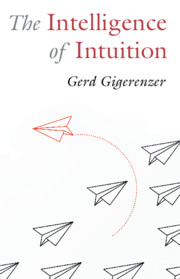Book contents
- The Intelligence of Intuition
- The Intelligence of Intuition
- Copyright page
- Dedication
- Contents
- Figures and Tables
- Preface
- Acknowledgments
- Chapter 1 We Know More Than We Can Tell
- Part I The War on Intuition
- Part II Intuition and Its Intelligence
- Chapter 5 Heuristics: The Tools of Intuition
- Chapter 6 Embodied Heuristics
- Chapter 7 Moral Intuition
- Chapter 8 Simple Heuristics to Run a Research Group
- References
- Index
Chapter 7 - Moral Intuition
from Part II - Intuition and Its Intelligence
Published online by Cambridge University Press: 28 September 2023
- The Intelligence of Intuition
- The Intelligence of Intuition
- Copyright page
- Dedication
- Contents
- Figures and Tables
- Preface
- Acknowledgments
- Chapter 1 We Know More Than We Can Tell
- Part I The War on Intuition
- Part II Intuition and Its Intelligence
- Chapter 5 Heuristics: The Tools of Intuition
- Chapter 6 Embodied Heuristics
- Chapter 7 Moral Intuition
- Chapter 8 Simple Heuristics to Run a Research Group
- References
- Index
Summary
I argue that moral intuitions are guided by social heuristics, which are not distinctive from other heuristics in the adaptive toolbox. One and the same heuristic can solve problems that we call moral and those we do not. That perspective helps explain the processes underlying moral intuition rather than taking it as an unexplained primitive. While moral psychologists debate over whether our moral sense is reflective and rational, as in Lawrence Kohlberg’s theory, or intuitive and nonrational, as in Jonathan Haidt’s theory, I believe that any assumed opposition and ranking is a misleading start. Both intuition and deliberation are involved in moral behavior, as they are in decision-making in general. The result of deliberation may become automized over a lifetime or generations, or intuitive judgments may be justified post hoc. If Darwin is right that the function of morality is to create and maintain the coherence of groups, then social heuristics are the tools towards that goal. This adaptive view explains apparent systematic inconsistencies in moral behavior and takes the phenomenon of moral luck seriously. Virtue is found not only in people, but also in environments.
Keywords
Information
- Type
- Chapter
- Information
- The Intelligence of Intuition , pp. 125 - 140Publisher: Cambridge University PressPrint publication year: 2023
